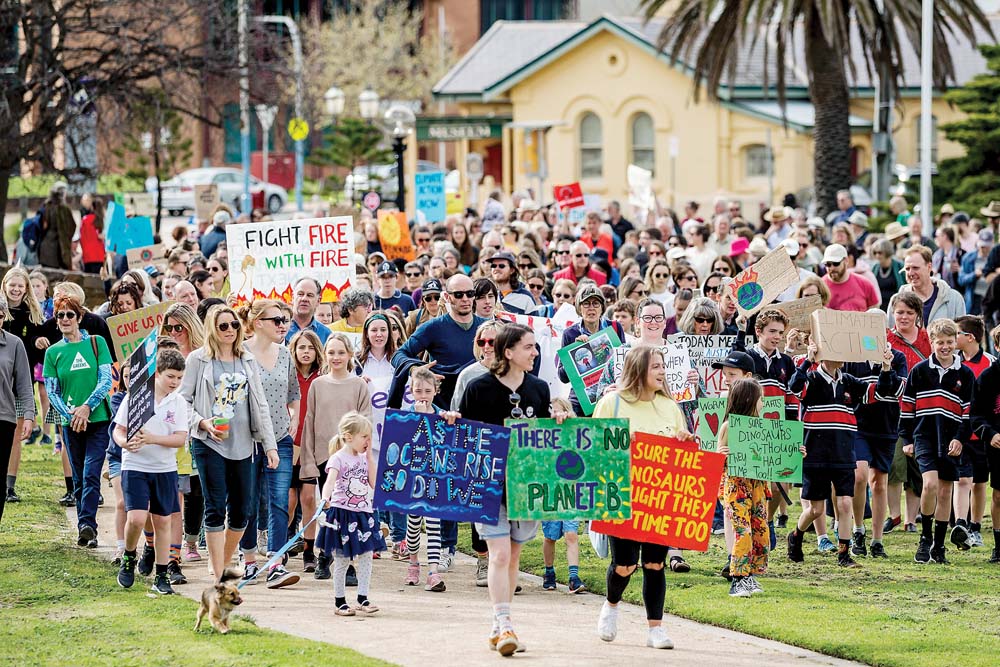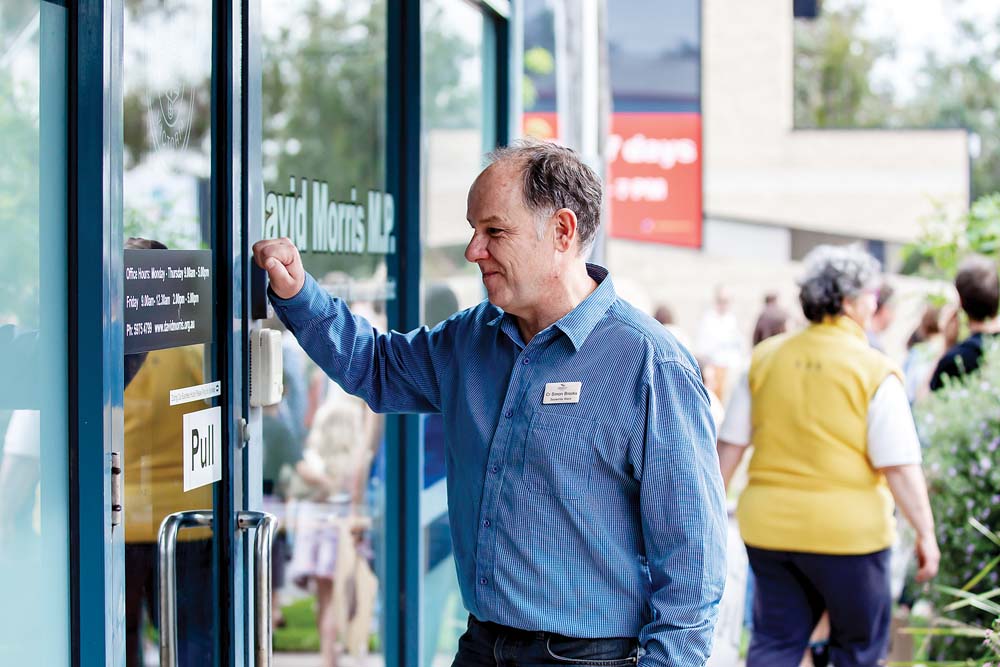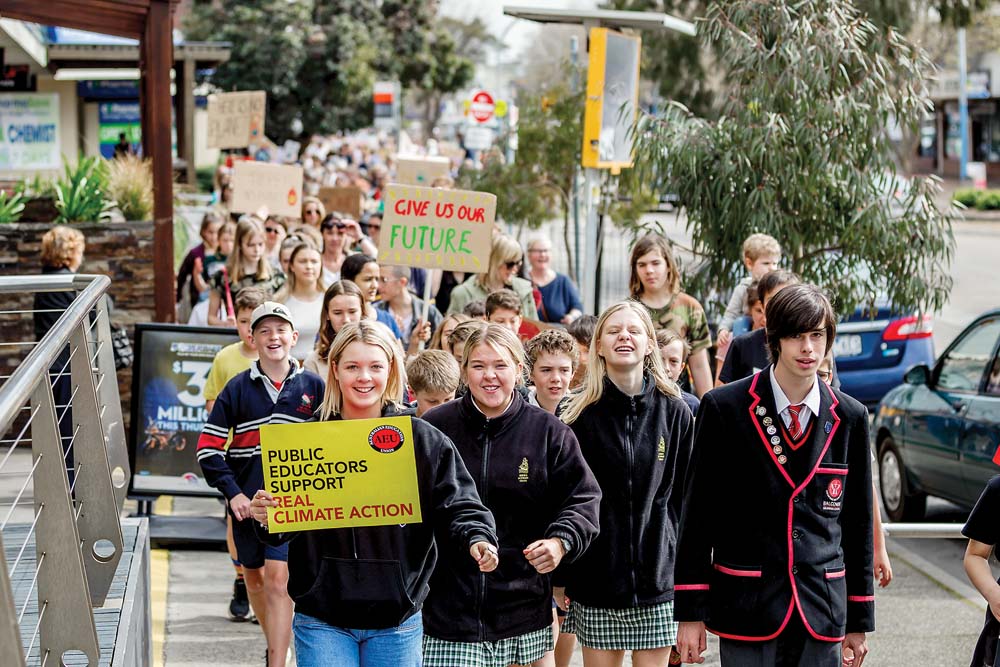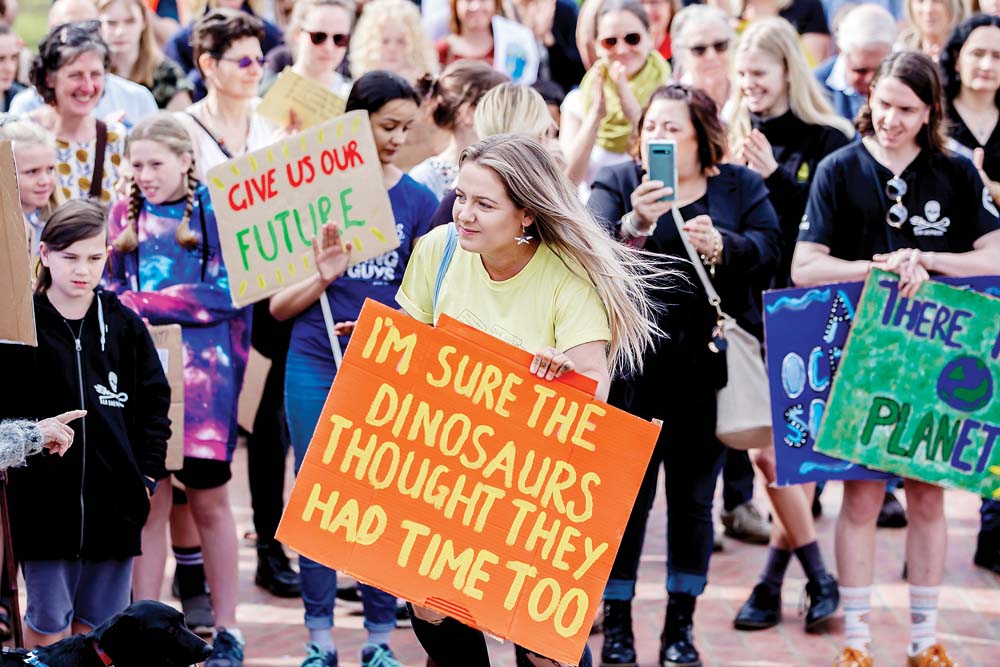
MORNINGTON police say the 500 students, parents and grandparents who rallied at Mornington Park last Friday (20 September) demanding positive action on global warming were well behaved and got their message across in a constructive way. Theirs was one of more than 100 school strikes for climate occurring around Australia.
The rallies were coordinated through the student-run School Strike 4 Climate website and followed strikes in March at which 150,000 people marched in Australia and 1.5 million took part worldwide.
Students came from Rye, Mornington Park, Balnarring, St Macartans and Mornington primary schools; Balcombe and Dromana colleges and Woodleigh, Peninsula, and Mornington and Mt Eliza secondary schools.
The rally also followed Mornington Peninsula Shire’s declaration of a climate emergency last month.
Speaking before a sea of mainly young faces, Cr Simon Brooks said the shire is working on ways to reduce greenhouse gas emissions and reduce the effects of climate change. (“Peninsula’s climate emergency” The News 12/8/19).

Students addressing the crowd included a nine-year old primary school boy, a year 12 girl and a Deakin University student. They spoke of their concerns for rising sea levels and a warming climate, and the impact this is having on birds, fish and animals – and people.
The students are advocating for no new coal, oil or gas projects in Australia; 100 per cent renewable energy generation and exports by 2030, and funding for a transition and job creation plan for all fossil fuel workers and communities.
After the rally a long column weaved its way up Main Street to the office of Mornington MP David Morris, only to find it was unattended.
“By taking time off school and working together around the world, we’ll show our politicians that people everywhere want climate justice and we’re not going away until we get it,” says the School Strike 4 Climate event description.
“We’ll strike in solidarity for everyone who’s already being hurt by the climate crisis and everyone who will be impacted if we don’t act now: workers, first nations’ peoples, young people, mining communities and more.”
The demonstrations were held three days before the United Nations Climate Action Summit in New York, which aims to bolster ambition and accelerate actions to implement the Paris Agreement on Climate Change.
Speaker Angus Boyd-Bell, 9, in grade 4 at Balnarring Primary School, said climate change was important because he had grown up spending time in the bush enjoying wildlife. “I have heard that over 200 species are gone each day because of climate change,” he said.
“Soon it could be zero, and maybe that will become a reality if we don’t change what we are doing now.
“Many politicians say that they are going to make changes to prevent climate change, but they are actually doing zero per cent of what they say they are going to do. We want change now and we are going to get it.”

Deakin University environmental science student Mariah Stellato, 22, said: “Today we are standing for what we are standing on.”
As part of her studies she had visited the Pacific island nation of Tuvalu, which hosted talks by government ministers to showcase the detriments of climate change. “This island will become the first country to be impacted by climate change which will result in its people being the world’s first environmental refugees,” Ms Stellato said.
“The Australian government’s solution was to give money to aid this island rather than change our fossil fuel consumption. Certain politicians state that loud, mouthy activists are stopping the fossil fuel industry and mining projects, such as Adani, from going ahead.
“That’s why today is important. Let us be the loud, mouthy activists taking action and treating climate change for what it is – a crisis.
“My favourite quote is: One small act, when multiplied by millions, can change the world. This is what is happening today. Climate change strikes are happening all around the world by millions of people in order to make a change.”
Rosebud Secondary College year 12 student Charlotte Pescud said she awoke to an early morning Facebook post which read, “Soon the sun will rise. Good luck Australia, the Philippines, Japan and all the Pacific Islands. You go first. Now lead the way. Happy striking.”

“This brought about a sense of urgency to me,” she said.
“Greta Thunberg, 16, who initiated the school strike, had written that the problem is that it is the people – us, kids, youth, that have to wish each other luck with success over getting our leaders to acknowledge our demands and to see climate change as the crisis and emergency it is.
“Instead, we have a prime minister who slings around lumps of coal in parliament and exclaims that there should be more learning and less activism. It is clear to me that our dear government fails to see what we are trying to achieve, which is the hope of having a future to live in.”
Ms Thunberg, of Sweden, quoted a native American as stating: “We have not inherited this Earth from our fathers, we are borrowing it from our children”.
“This emphasises the complete disconnect to the environment many people have that is ruining our world. Every human utilises Earth’s resources as a means of survival and comfort,” Ms Thunberg said.
“Forests are stripped bare, land is foraged and degraded, air is polluted, water sources are infested by plastics and oils, and species are abused.
“The environment, the very thing that enables our existence, is being suffocated by the increasing impacts of our mindless consumption and lifestyle. It should be ingrained within our moral code to respect the environment, others and ourselves. If we do not act now, an irreversible chain reaction will be set off. Time is running out.”
The next climate strike will be at Mornington Park, 9-11am, Saturday 30 November.



